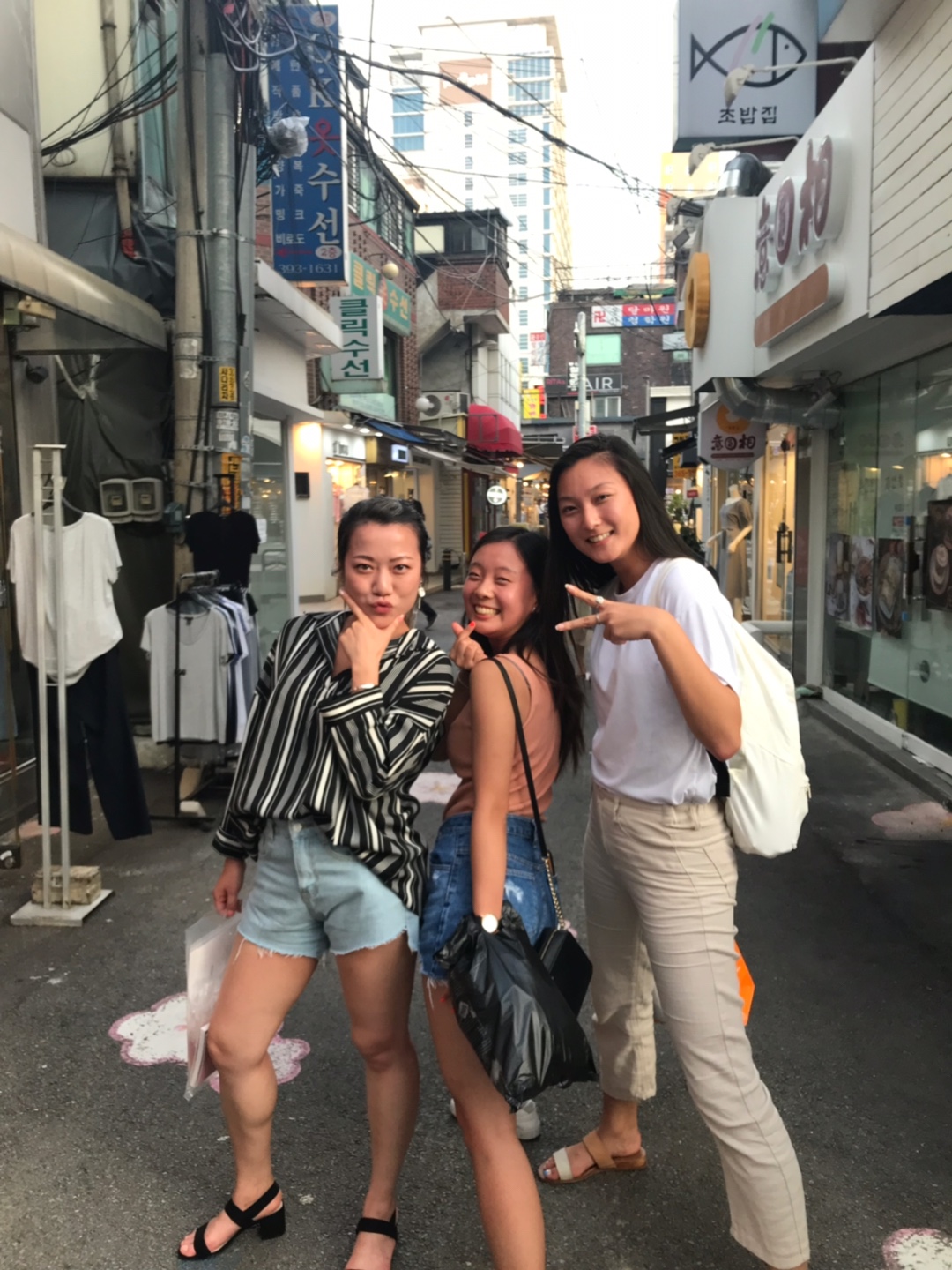I am now approaching the very end of my SLA experience. I am quite proud of the language skills that I have accumulated, as well as the rich culture that I have been able to immerse myself in. I have continued along with many of the strategies that I described in previous blog posts, including the flash cards and extensive writing exercises. I feel much more comfortable starting up conversations with locals, which I have found is an excellent strategy for language acquisition. Learning from a native speaker is wonderful, but it is often very formal. Hearing how the average German speaker talks is invaluable in deciding how I should actually speak. While my vocabulary had been improving rapidly, it was only through this strategy that I have been able to confidently discern the connotations of certain words and when a layperson would use them in a conversation. A final incredible cultural experience that I had was going to see a Bayern Munich game. The team is wholly beloved by the city, and I had heard locals rave about the team and the sport so often that I decided I had to see it for myself before leaving. The atmosphere at the game was incredible. I spoke to the fans around me, many of whom had grown up watching the team. Their passion was infectious, and they taught me many of the cheers for Bayern Munich, as well as the soccer terms that Germans used. While this wasn’t something that my class would have taught me, it is certainly an important part of the culture and something that would come up regularly in a conversation with the average German sports fan. I am quite pleased with the progress I have made with the language during the SLA experience, and I believe that the language acquisition skills that I have learned and practiced extensively will allow me to succeed throughout the rest of my German classes back at Notre Dame.
Category: Uncategorized
Class 2
I am now a week into my second class. My new teacher is a lot younger, and thus has a very different approach to language learning. She focuses a lot on writing, which is a nice change as this is something that I could always use practice with. It forces me to slow down and really consider my grammar and word choices, as opposed to speaking where I have to move quickly. We have to write a short essay every single day, and the corrections that I have gotten back so far have helped me to pinpoint the mistakes that I make regularly so I can address them. We have also been getting into super advanced grammar. The nightly homework has been helpful in practicing these skills. I have been trying to use these new formations when I speak to my friends or locals outside of class. Applying the skills to real conversations is a strategy that I’ve found to work really well in effectively building language skills. One recent cultural experience I had was visiting the BMW world. Engineering, particularly relating to cars, is an important cultural area for Germans, as well as a great source of pride for the country. Besides learning a lot about the vehicles, it was an interesting language exercise. I had never experienced many of the technical vocabulary words before, so I got extensive practice learning to best use context to make an educated guess as to what certain words meant. Once I did that, I would check myself against the English translations of the information boards to see how well I did. By the end of the BMW Museum tour, I could translate the entire paragraphs with very few mistakes!
Initial Language Acquisition
I am three weeks into my German course, and I can already feel my language skills improving. The flashcards that I made for myself certainly came in handy in buffing my vocabulary abilities. Immersion is really the best way to expedite language acquisition. I need to force myself to only speak to the other students in the class in German, even when they can speak English fluently. The more formal conversations outside of class are a great supplement to the grammar and vocabulary lessons in the lectures. In addition to the language program, I have been able to take in a large amount of German culture. I have visited the Neuschwanstein Castle and the small beautiful village of Landshut. Listening to the tour guides speak in rapid fire German on these trips has been a struggle. It was also difficult to keep up with the locals I spoke to when my friends and I visited the English Gardens a few days ago, a popular spot for Munich residents on warm days. However, I can definitely say that experiences like these with native speakers has forced me to improve my listening abilities so that I can keep up with those who speak German quickly. This is a very valuable skill that I am proud to be getting stronger at.
Arriving in Munich
The beginning of my SLA experience in Munich has been fantastic. I faced a challenge right from the start when I had to figure out the public transportation system to get to my language institute. My German was a little rusty, but thankfully I was able to communicate enough with a friendly airport worker to buy the right subway ticket. The course has been challenging, but helpful. Four and a half hours a day of German, in addition to the immersion, will definitely progress my skills rapidly. My teacher chooses to only speak German, which I believe is an effective strategy to force us students to practice with him. He convinced us to speak as much as possible, both by asking us lengthy questions and by giving us conversation prompts to work on with a partner. He is also a big believer in the power of vocabulary. It might benefit my acquisition of the language if I make flashcards to practice all of the words he emphasizes in class and the ones I have encountered often in the city. Food was particularly difficult to deal with, as I didn’t know the words for many of the ingredients. I had to just point at first, but I would really love to be able to communicate fluently with the German vendors. Thankfully, I am beginning to figure out many of the common dishes and everything tastes delicious!
Reflections
1. When we begin learning language as a child, words are associated with images, emotions, and our senses – not to other words. As a visual learner learning a foreign language, this is something that has always caused me problems. It has always been tempting for me to create flashcards with just the german words and their english translations. While this usually serves me well for the next quiz or test, I often forget what I learned soon after. while in Dresden, I found it most helpful to be able to learn new words by connecting them to new places and experiences. Rather than giving these words meaning by relating them to English, they had a meaning of their own. Even by adding pictures or a German definition of the word instead of only its English translation, I hope to somewhat replicate this experience as I continue studying German at Notre Dame.
2. Reading is one of the most important methods through which we maintain and further our language proficiency and vocabulary. Because of this, it was an important goal for me to be able to read even an elementary novel, so even while in the U.S. and after graduation, I can continue growing my German vocabulary and fluency. The question that has arisen for me as I begin reading a book that my family gifted to me is how often should I be looking up new words while reading? For me, it is tempting to look up every single word that I don’t know, but then it usually ends up taking around 5 minutes to read just one page. I hope to be able to find a balance between learning new vocabulary by looking up new words and also by using context to build my own understanding of new words.
3. More often than not, I have found that English has proven to be more of a hindrance than a help as I learn German. As a result, I often find myself initially translating what I would like to say or write directly from English to German, ending up with a mix of both English and German grammar. Similar to my last point, I have thus found it most valuable to think about what I am trying to express purely from a German language and grammar standpoint. Rather than German being a product of my knowledge of English, it becomes more of its own independent language.
Feijoada for Life
I told my Brazilian-native friend, Igor, about my complete obsession with feijoada, so we went to visit a local restaurant to get two good servings of the dish. At the restaurant, I engaged both Igor and the waitress, Carol, about the food, its ingredients, its history, and its preparation. Despite its incredibly good taste, Carol told me that it’s actually a pretty easy meal to make. Igor then explained that the dish originated in Brazil from slavery, as enslaved individuals mixed together the leftover scraps from unused ingredients to create meals for themselves. Since then, the dish has stood the test of time, with some slight variations here and there. Throughout Brazil, feijoada is considered food for the soul that’s good for all, rendering it a dish that transcends even economic divides, cultures, and racial lines. It is consumed by virtually all Brazilian identities. It exemplifies to me how food acts as a common thread that can bring people together. This immediately reminded me of “soul food” in the United States, which has a very similar history and function with the African-American community. Carol also told me that Brazilian feijoada is most commonly cooked with black beans. Talking about the ingredients made me admittedly sad, because I didn’t know if I’d be able to cook and eat this meal myself with the limited items I would find once I return to the states. After some talking, Carol and Igor came up with the cool idea of filming a tutorial on how to make feijoada so that I would only be one click away from Brazilian food and culture. Carol got one of the cooks to come out from the back, and he quickly recited the every quick and easy recipe to me. Following this, Igor created a video for me—out of the kindness of his very heart—explaining with great detail how to successfully prepare feijoada from Rio de Janeiro, so that my connection to Brazil will forever be just one click away.
Post-Program Reflection
- This summer I learned that the language acquisition process requires patience and plenty of practice. At first, I was very hesitant to speak out of fear that I would make a mistake or would not be understood. I learned that in order to make any progress with languages it is absolutely necessary to get over that fear and speak at every opportunity even if locals can speak English. Luckily, we had great discussions during class every day on topics such as the environment, health care, and women’s rights. I got to share my culture’s perspective but what proved more interesting was hearing what my professor shared on French culture and current events. Furthermore, I engaged in cultural activities sponsored by the school during which we visited lesser known museums and learned about French cinema and television. One of my goals was to be able to converse in French well and I think I reached my goal to some extent but I am still working on it. The speed of the French language is much faster than English so that has been my biggest challenge, andI am working on training my ears to adjust to how fast the French speak.
- The SLA experience is so much more than language acquisition in my opinion because of the unique opportunity to live in a different country meeting all kinds of people. In my class of 13, I had students coming from 11 different countries. During discussion, everyone talked from their country’s perspective (in French of course) and it was beyond fascinating to hear about their countries and cultures from an authentic and genuine point of view. We are living in a confusing world where the ideas of prejudice and nationalism steer young and old minds alike from looking outwards toward the rest of the world. I found that having casual conversations over coffee and building relationships with my classmates opened my eyes in ways I could never predict. For students preparing to start their summer language study, I would highly recommend finding a school that targets international students and accommodates foreigners looking to work in that country. At first, I was intimidated at the prospect of taking classes with working age adults but the class dynamic pushed me to realize that age should never deter you from trying and from expressing yourself. I think it is really important for students to go into this experience with an open mind and an open heart. I found myself seeking discomfort by saying yes to excursions with classmates and it really paid off.
- After this SLA experience, it is really important to me that I keep up with my French because of how much time and effort I have put into cultivating this skill set. Since I am an International Economics major, I will have to prioritize French classes in my schedule which I am very happy about. My hope is to take a French class every semester until graduation to maintain my French. Beyond university requirements, I was thinking about applying to become a French tutor. I have a very strong French grammar background and the more conversation practice I can get the better. I have always had an interest in working abroad and have acquired contacts due to past summer internships that I have done in Europe. My hope is to use to my International Economics degree and this network to find a job that does business with Europe and Asia. This experience has really opened my eyes to the world beyond the United States and I hope to let this new perspective guide me as I start my career after graduation.
Final Days in Seoul :(
I just want to begin this post by expressing how grateful I am that I was selected to be given the SLA grant which provided me the opportunity to study in Seoul. I have met such amazing people and had incomparable experiences that I would not have been able to have without this opportunity.
The final week of the program was bittersweet. On one hand I was excited to go back home, but on the other hand I did not want to leave the people I have become so close with. It is crazy how close people can get in just 6 weeks during a summer program. I was not ready to leave, especially knowing that it would be very hard to see these people again because they live across the country and around the world.
We had our final for Korean, which not gonna lie, was really hard. I was pretty confident with the listening, but the reading really got me. There were some sentences where I could not identify any of the words, which made me realized how much more work I needed to put in if I wanted to become fluent in Korean. It made me feel better when we finished our exam and the rest of the class also agreed that the final was pretty hard. I did better than I thought I would, so I am thankful for that. But I still have a long ways to go if I want to be completely comfortable in Korean. One of my classmates printed out a picture of our class and handed it out to everyone. It was really sweet.
I also made sure to eat all the foods I really liked before the end of the program. I love sweet potato pizza. This is what it looks like.
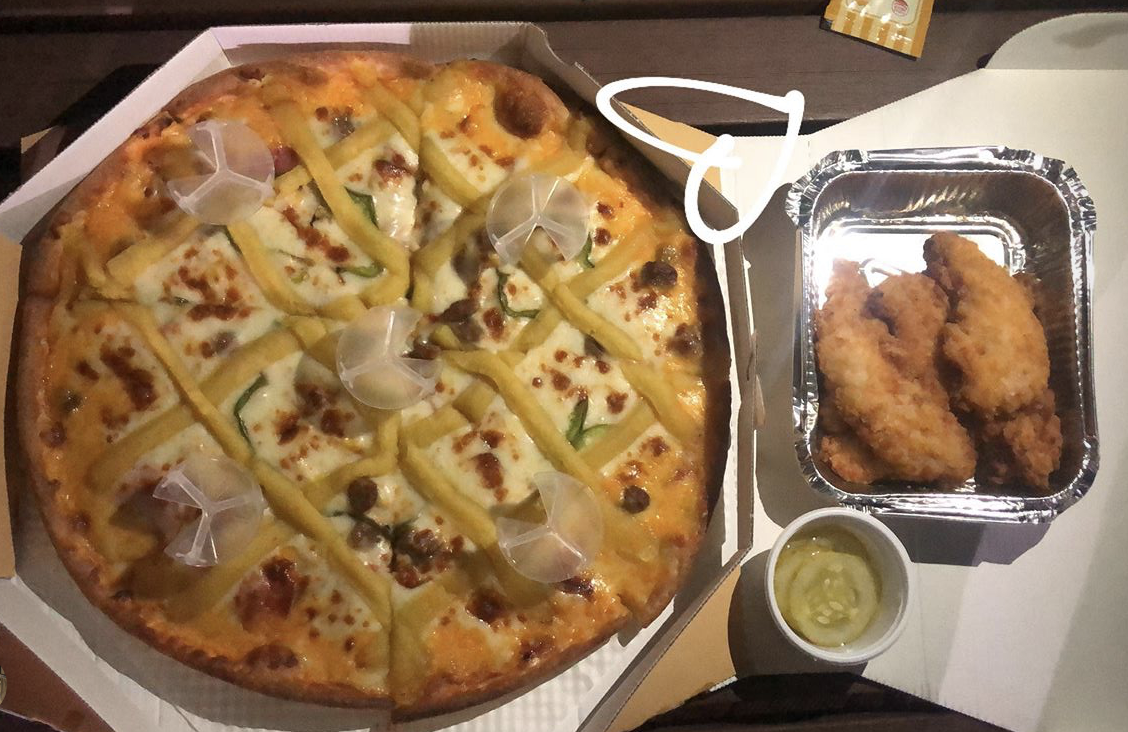
It is the perfect mix between sweet and savory and it is so good. There aren’t any places near where I live that sell sweet potato pizza, and definitely none near Notre Dame. This pizza will be deeply missed.
I also love this cheese sprinkled chicken. It’s called 뿌링클 치킨 (Bbrinkle Chicken) and it is so good. I never truly appreciated Korean chicken wings until I actually had them in Korea. There are so many different flavors and a lot of them are marinated so well. The Bbrinkle chicken also come with cheese balls, which are basically doughnut holes with cheese inside, which is also very good.

I also fell in love with Myongrong Hot Dog. It is basically a corndog with mozzarella cheese inside, but they sprinkle it with sugar. It is SO GOOD. I tried making it at home once but it wasn’t the same. There is a Myongrong hot dog in LA, but I live in NJ so it is very unlikely that I will be able to have Myongrong hot dog again until I go back to Korea, or I decide to visit LA.

Korean food will always have a special place in my heart and it will be dearly missed. Same goes for all of the amazing people I met at Yonsei.
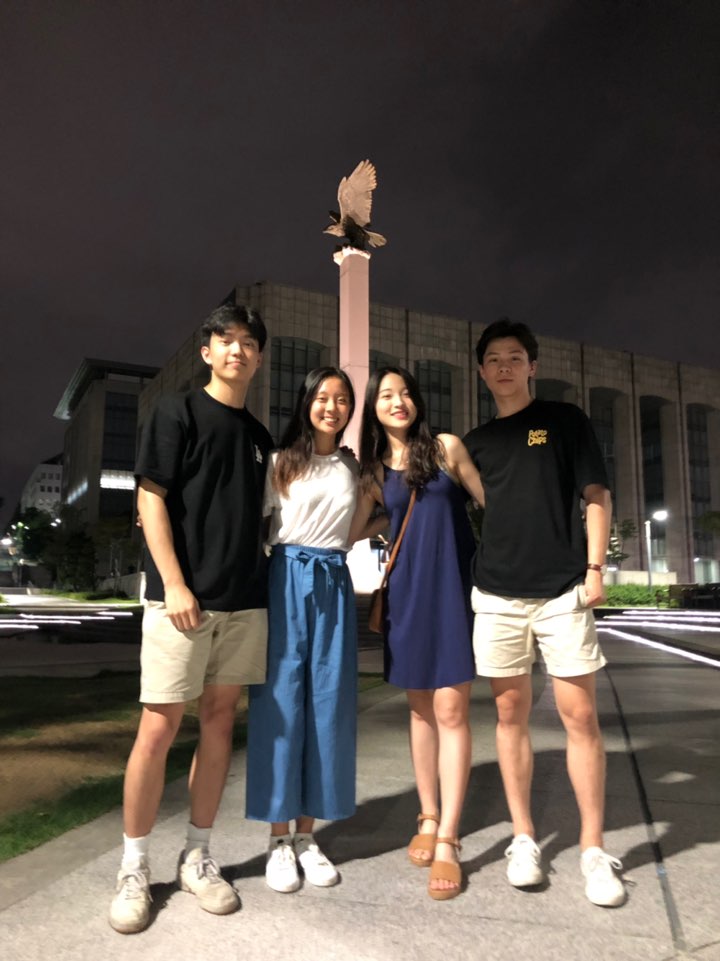
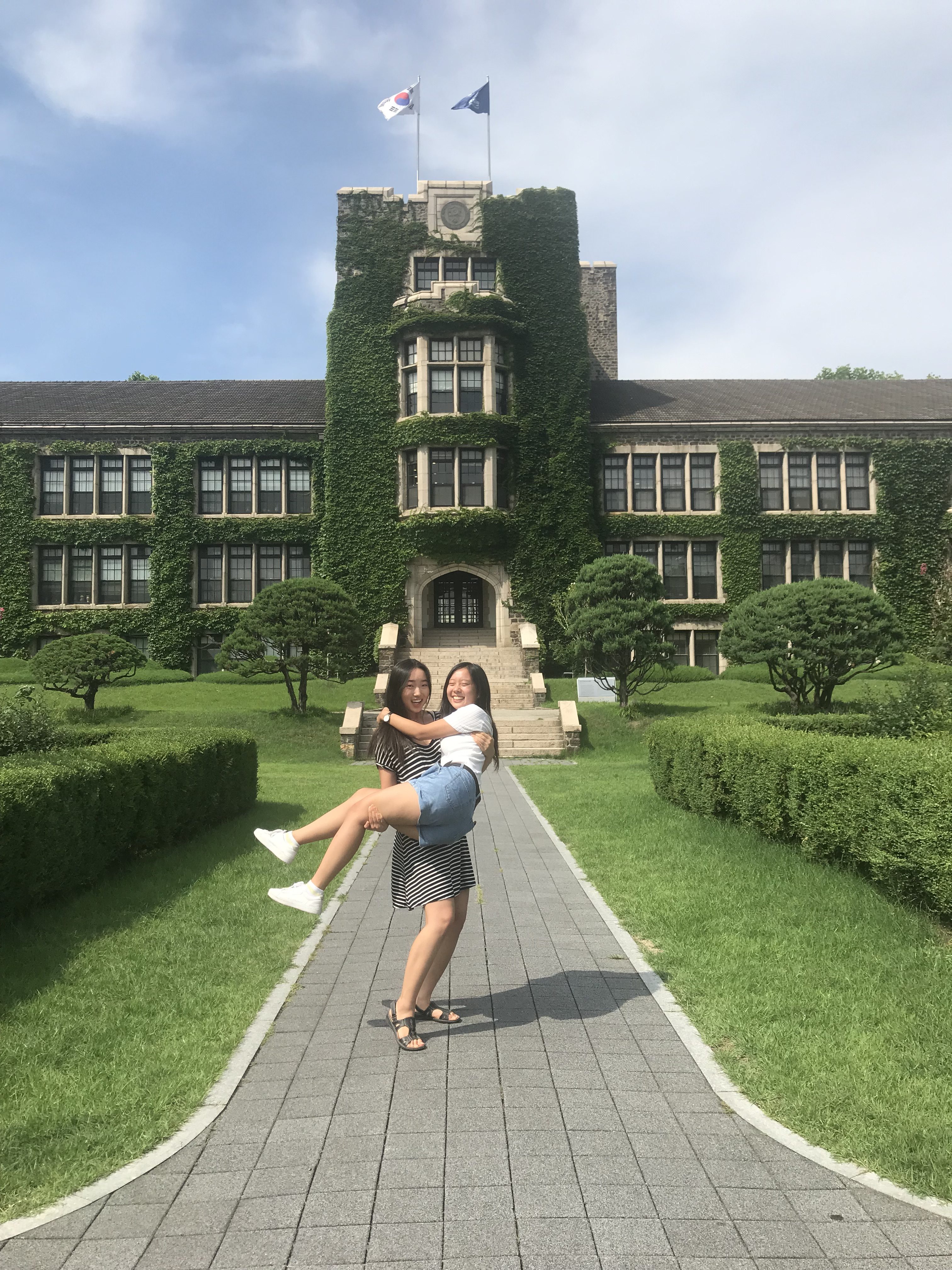 I have definitely seen my Korean improve. I don’t get too anxious anymore whenever restaurant owners/store owners ask me a lot of questions. I don’t get anxious at all asking restaurant owners/store owners my own questions. I have become a lot more confident with my Korean typing and my Korean writing. But I definitely need to work a lot more if I want to understand newspaper articles and have a fluent conversation with an adult Korean native. My sentences are still kind of choppy, but I definitely have time and the opportunity to improve in my Korean class this upcoming fall semester.
I have definitely seen my Korean improve. I don’t get too anxious anymore whenever restaurant owners/store owners ask me a lot of questions. I don’t get anxious at all asking restaurant owners/store owners my own questions. I have become a lot more confident with my Korean typing and my Korean writing. But I definitely need to work a lot more if I want to understand newspaper articles and have a fluent conversation with an adult Korean native. My sentences are still kind of choppy, but I definitely have time and the opportunity to improve in my Korean class this upcoming fall semester.
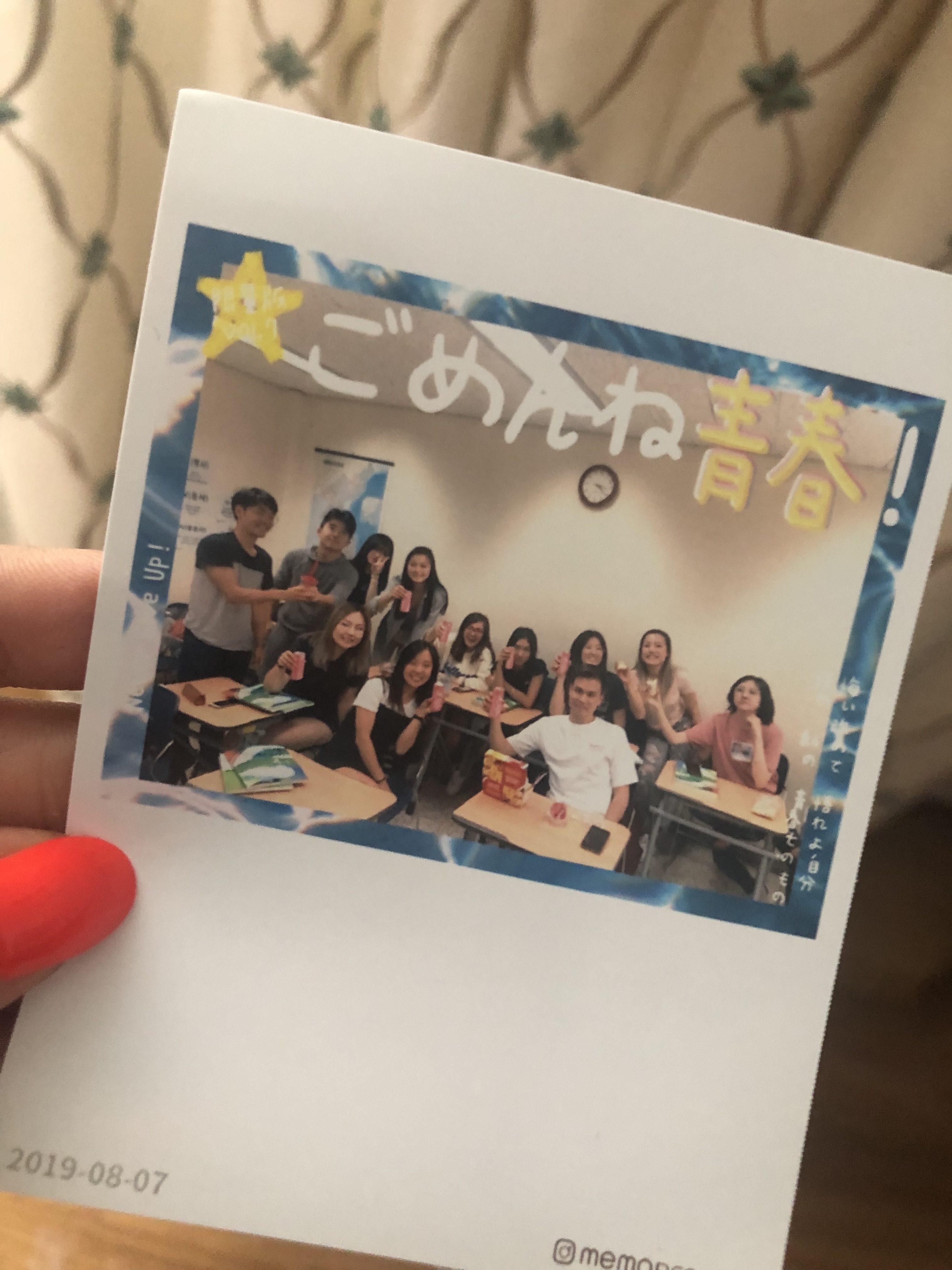
Some Thoughts at the End of a Summer School
Aspirantum summer school in Armenia was a great experience! We had many opportunities to improve our skills in my fields including but not limited to Persian language and cross-cultural relationships.
Friendly atmosphere and open-mindedness of participants, professors, organizers and the people of Yerevan made our Persian learning adventure fun and exciting. I have participated in Aspirantum summer school for Persian with quite limited knowledge, however, at the end of the program, thanks to the intensive teaching method which was adopted by Aspirantum, I managed to obtain a decent level of reading, speaking, writing and listening skills of Persian. Besides Persian language training, the program organized many trips to several different places in the Republic of Armenia which enabled us to get more acquainted with the Armenian culture and traditions. Especially, as a historian, I liked the trips to the rural Armenia, which aimed to introduce the Armenian historical heritage in the region. The trip to the Sevanakerd monastery and Sevan Lake area was far and away best in my opinion because first of all, the region was an important place for understanding the interfaith and cross-cultural relationships of the Armenian people with the other people and secondly, the lake itself was a great place for touristic activities and I really enjoyed swimming and doing some sunbathe there.
In the end, I was also amazed by the diversity of age of my classmates; this helped me enrich my knowledge from other people’s experiences. Additionally, besides getting acquainted with Armenian and Persian culture, thanks to the international participant profile in the program, I was able to know more about different cultures and meet plenty of people from different ethnic backgrounds. In brief, I can’t say more about Aspirantum Persian summer school because it is more than what words can describe: fun, love, study and happiness.
Nios fearr Gaeilge?
Now that I’ve been back in the States for about a week I’ve been left to ponder if my Irish actually improved at all. I did very well in the classroom, and think that my ability to read and write has improved, but I’m not certain about speaking.
I can understand most of what is said to me, but I find myself panicking, utterly tongue-tied, and devoid of anything resembling vocabulary when trying to speak. I think my host family was shocked to learn I was in the Ardrang (the advanced course), because my spoken Irish at home was so poor compared to people in lower level classes. To be fair, one of the other students at my house was Breton and periodically I attempted to engage him in conversation in French, and that went very much the same way, though I’d say my fluency level in French is much, much higher than my Irish. It’s somewhat frustrating as I had really hoped to overcome this stumbling block through this immersion program. I have a diagnosed social anxiety disorder, so I’m wondering if its just something broken in me rather something than any amount of speaking practice can fix. My issues with communicating with French speakers certainly suggest its the former. I’d also be lying if I said I don’t have issues speaking English at times as well.
Two other students going into Advanced Irish I attended Oideas Gael this past summer; their speaking abilities were already head and shoulders above my own and likely are lightyears ahead now, so who knows how Irish will go for me this semester. We didn’t focus on speaking all that much in the classroom, so I am wondering if I would have benefited more from attending Oideas Gael in Donegal, though I’ve been working on focusing on the Connemara dialect.
My adviser has told me numerous times that I’m too hard on myself, and I’m hoping that’s true here, that I just hit a plateau and need to keep pushing through, that I’m better than I give myself credit for. Again, we’ll see what this semester holds.
